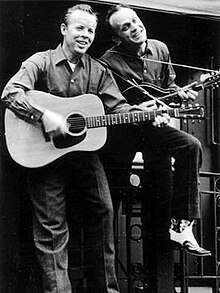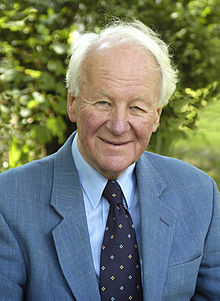
* * * *
In 1952 the Louvin Brothers – seen above – recorded a song, “That word broad-minded is spelled s-i-n.” The song in part: “I read in my Bible, they shall not enter in. For Jesus will answer, Depart, I never knew you.” (But see John 6:37: “whoever comes to me I will never cast out.”)
That’s followed by the refrain, “That word broadminded is spelled s-i-n.”
Which brings up two ways to interpret the Bible. One is the hellfire-and-brimstone approach of the song and/or album above. That approach sees the faith of the Bible as both exclusive and excluding. The other approach focuses on a loving God, as seen in the promise Jesus made in John 10:10, that He came so His followers could live life “in all its abundance.” Which raises the question: Can you live a life of abundance while being narrow-minded?
One word for “strictly” interpreting the Bible is the fundamentalism of the Louvin Brothers song. But maybe its all a matter of context…
 The strange thing about Ira Louvin – at right in the picture at left – is that he “was notorious for his drinking, womanizing, and short temper.” (Or maybe it wasn’t so strange after all.) Ira ended up getting married four times, and his third wife Faye ended up shooting him six times. (Four times in the chest.) That was after one of the times he allegedly beat her up.
The strange thing about Ira Louvin – at right in the picture at left – is that he “was notorious for his drinking, womanizing, and short temper.” (Or maybe it wasn’t so strange after all.) Ira ended up getting married four times, and his third wife Faye ended up shooting him six times. (Four times in the chest.) That was after one of the times he allegedly beat her up.
But we digress…
Wikipedia defined Fundamentalism as a strict adherence to specific theological doctrines, and said the term “usually has a religious connotation indicating unwavering attachment to a set of irreducible beliefs.” The article added that the term was coined from the Five Fundamentals, set down between 1910 and 1920.
Those Five Fundamentals were: 1) That the written Bible was inspired by God “and the inerrancy of Scripture as a result of this;” 2) That Christ was “virgin born;” 3) That Christ’s death was the atonement for sin; 4) That Christ had a “bodily resurrection;” and 5) That Christ’s miracles were a “historical reality.”
One sticking point for many people is the idea of Biblical inerrancy. That’s the “doctrinal position that the Bible is accurate and totally free of error… Conservative Christians generally believe that God inspired the authors and redactors of the Bible. Hence, they wrote material that was error-free.” (See the Wikipedia article.)
But there is another way to read and interpret the Bible.
 And to many people it offers a better path to the type of abundance Jesus promised in John 10:10. That Bible path is exemplified by John R. W. Stott – at right – in his book Understanding the Bible.
And to many people it offers a better path to the type of abundance Jesus promised in John 10:10. That Bible path is exemplified by John R. W. Stott – at right – in his book Understanding the Bible.
Stott was an Anglican cleric whom Time magazine ranked among the 100 most influential people in the world. And he made three keys points about reading and studying the Bible.
One key point disputed the idea that “every word of the Bible is literally true.” Stott said the Bible is without error “in all that it affirms.” He added that the words of the Bible were true “only in context.” He cited the Book of Job, noting that the first 37 chapters consisted of dialogue between Job and his ostensible comforters.
On the other hand, the truth of the book comes only in the last five chapters. “The book as a whole is God’s word, but the first thirty-seven chapters can be understood only in the light of the last five.” (E.A.) Consider – for example – Job 3 :1-22, summarized as follows:
Job opened his mouth and cursed the day of his birth… “Why did I not perish at birth, and die as I came from the womb… For now I would be lying down in peace; I would be asleep and at rest… Or why was I not hidden away in the ground like a stillborn child, like an infant who never saw the light of day… Why is light given to those in misery, and life to the bitter of soul, to those who long for death that does not come, who search for it more than for hidden treasure, who are filled with gladness and rejoice when they reach the grave?”
(Emphasis added.) So – if you wanted to justify suicide, for example – Job 3 might be just the ticket. But that would be true only if you took that chapter – standing alone and out of context – as the “inerrant word of God.” That is, only if you believe that every word in the Bible must be taken as literally true, regardless of context.
Put another way, Job expressed those sentiments in Chapter 3, at one of the low points in his life. (And don’t we all have those.) But Chapter 3 could definitely be “taken out of context.”
* * * *

“Job Hearing of His Ruin…”
* * * *
The album image is courtesy of Wikipedia. For the lyrics, see Louvin Brothers – Broadminded Tabs, Chords – Cowboy Song Lyrics. To see an older Charlie Louvin singing the song, see also, That word,” Broadminded” is spelled S-I-N. – YouTube.
For more, see: The Louvin Brothers – Wikipedia. Note that the “s-i-n” song was not included in the “Charted Singles” section, which began with 1955’s “When I stop dreaming.” Note also: “In 1963, fed up with Ira’s drinking and abusive behavior, Charlie started a solo career, and Ira also went on his own… Ira died on June 20, 1965, at the age of 41. He and his fourth wife, Anne Young, were on the way home from a performance in Kansas City… A drunken driver struck their car head-on, and both Ira and Anne were killed instantaneously. At the time, a warrant for Ira’s arrest had been issued on a DUI charge.” (You might say, on the difference between Ira’s public and private persona, it “could be spelled ‘h-y-p-o-c-r-i-t-e,'” but that would be a bit too snippy for this Blog. Suffice it to say, Ira was merely human, like the rest of us.)
See also John Stott – Wikipedia, the free encyclopedia.
The “Job” image is courtesy of BIBLICAL ILLUSTRATIONS OF GUSTOV DORE: JOB HEARING OF HIS RUIN.
As for Jesus saying, “Depart, I never knew you,” that was a reference to Matthew 7:21-23:
Not everyone who says to Me, ‘Lord, Lord,’ shall enter the kingdom of heaven, but he who does the will of My Father in heaven. Many will say to Me in that day, ‘Lord, Lord, have we not prophesied in Your name, cast out demons in Your name, and done many wonders in Your name?’ And then I will declare to them, ‘I never knew you; depart from Me, you who practice lawlessness!’ (Emphasis added.)
As is usually the case, it helps to have the full reading, to ensure things aren’t “taken out of context…”
And another, Matthew 7:1 warns, “Do not judge, or you too will be judged. For in the same way you judge others, you will be judged, and with the measure you use, it will be measured to you.” Which is why I always try to give other people a break, so God might “judge me” the same way…
* * * *